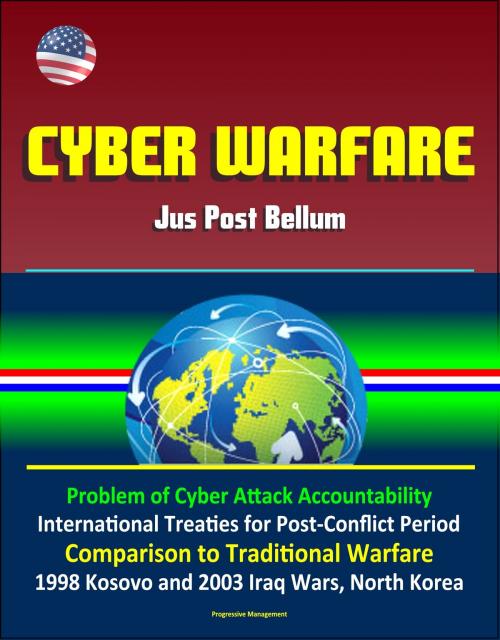Cyber Warfare: Jus Post Bellum - Problem of Cyber Attack Accountability, International Treaties for Post-Conflict Period, Comparison to Traditional Warfare, 1998 Kosovo and 2003 Iraq Wars, North Korea
Nonfiction, Computers, Networking & Communications, Computer Security, Operating Systems, Application Software| Author: | Progressive Management | ISBN: | 9781370885817 |
| Publisher: | Progressive Management | Publication: | November 29, 2016 |
| Imprint: | Smashwords Edition | Language: | English |
| Author: | Progressive Management |
| ISBN: | 9781370885817 |
| Publisher: | Progressive Management |
| Publication: | November 29, 2016 |
| Imprint: | Smashwords Edition |
| Language: | English |
This excellent report has been professionally converted for accurate flowing-text e-book format reproduction. There is a lack of attention to the aftermath of a deployed cyber weapon: There is no mechanism for the assignment of accountability for the restoration of affected infrastructure and remediation of violation of established laws of war after cyberattacks occur. This study analyzes International Humanitarian Law and international treaties as they apply to the cyber post-conflict period and explores current jus post bellum frameworks, which can be used to design a cyber-warfare jus post bellum framework. It also analyzes analogies to traditional warfare in the damage assessment and aid provided during the recovery period of the 1998 Kosovo and the 2003 Iraq Wars. It also discusses the available international cyber organizations. As an example, the study analyzes responses to cyberattacks in a case study involving South Korea and North Korea.
Additionally, this study examines the related issues of the effects of deploying a cyber-weapon, the ways to establish acceptable levels of attribution, the challenges of cyber-damage assessments, and the ability to contain and reverse cyberattacks. This thesis proposes a cyber-warfare jus post bellum framework, with emphasis on prevention and cyber weapons control, proposes cyberattack relief-effort actions, and offers a post-cyberattack cost checklist.
CHAPTER I - INTRODUCTION * A. CYBER WARFARE: JUS POST BELLUM FRAMEWORK DEVELOPMENT JUSTIFICATION * B. THESIS PURPOSE * C. THESIS OUTLINE * CHAPTER II - BACKGROUND * A. INTERNATIONAL HUMANITARIAN LAW * B. JUS POST BELLUM * C. JUS POST BELLUM IN CYBERSPACE * D. TREATIES AND ARTICLES APPLICABLE TO JUS POST BELLUM * 1. Hague Conventions * 2. Geneva Convention * 3. Conventions Prohibiting Certain Conventional Weapons * 4. Additional Treaties Prosecutable for War Crimes * 5. Genocide * 6. Mercenaries * 7. Additional Rights Violations * 8. UN Charter * a. Article 39 * b. Article 51 * c. Article 92 * d. Article 94 * 9. Statute of the ICJ * a. Article 36 * b. Article 38 * c. Article 41 * 10. ICC * 11. NATO * E. CONCLUSION * CHAPTER III - CYBERATTACKS * A. TYPES OF CYBERATTACKS * B. CYBERATTACK VECTORS * C. CYBERATTACK EFFECTS * D. CYBER-WEAPON DAMAGE ASSESSMENT * E. ATTRIBUTION * F. CONTAINABILITY AND REVERSIBILITY OF CYBER WEAPONS * G. CONCLUSION * CHAPTER IV - PAST KINETIC OPERATIONS * A. STABILITY OPERATIONS * B. DAMAGE ASSESSMENT KINETIC VERSUS CYBER * 1. Jus Post Bellum Cost * 2. Entities Involved in Reconstructions * a. 2003 Iraq War * b. 1998 Kosovo War * C. INTERNATIONAL CYBER ORGANIZATIONS * D. CONCLUSION * CHAPTER V - CASE STUDY: NORTH KOREAN CYBERATTACKS * A. INTRODUCTION * B. NORTH KOREA * C. NORTH-KOREA SUSPECTED CYBERATTACKS * 1. July 2004 * 2. August/September 2005 * 3. July 2006 * 4. October 2007 * 5. September 2008 * 6. March 2009 * 7. July 2009. * 8. November 2009 * 9. January, March, and October 2010 * 10. March 2011 * 11. June 2012 * 12. June 2012 * 13. March 2013 * 14. June 2013 * 15. November 2014 * D. ATTRIBUTION ANALYSIS OF THE ATTACKS * E. ANALYSIS * 1. Damage Costs * 2. Establishing Attribution * 3. Cyberattack Responses * F. CONCLUSION * CHAPTER VI - RECOMMENDATIONS * A. CYBER-WARFARE JUS POST BELLUM FRAMEWORK * 1. Outlaw Unethical Cyber Weapons * 2. Add Critical Cyber Infrastructure to the Protected Sites * 3. International Community Involvement * 4. Accountability * a. Punishment * b. Restoration of Affected System and Infrastructure * c. Proportionality * 5. Plans * B. CYBERATTACK RESPONSE * 1. Step 1: Information Gathering * 2. Step 2: Cyberwar * 3. Step 3: International Notification * 4. Step 4: Formal Investigation * 5. Step 5: Attribution * 6. Step 6: Cyberattack Response * 7. Step 7: Recovery * a. Cost Assessment * b. Vulnerabilities Elimination * c. Anti-malware Signatures * d. Restoration * e. Incident Response Planning * f. Education * CHAPTER VII - CONCLUSION
This excellent report has been professionally converted for accurate flowing-text e-book format reproduction. There is a lack of attention to the aftermath of a deployed cyber weapon: There is no mechanism for the assignment of accountability for the restoration of affected infrastructure and remediation of violation of established laws of war after cyberattacks occur. This study analyzes International Humanitarian Law and international treaties as they apply to the cyber post-conflict period and explores current jus post bellum frameworks, which can be used to design a cyber-warfare jus post bellum framework. It also analyzes analogies to traditional warfare in the damage assessment and aid provided during the recovery period of the 1998 Kosovo and the 2003 Iraq Wars. It also discusses the available international cyber organizations. As an example, the study analyzes responses to cyberattacks in a case study involving South Korea and North Korea.
Additionally, this study examines the related issues of the effects of deploying a cyber-weapon, the ways to establish acceptable levels of attribution, the challenges of cyber-damage assessments, and the ability to contain and reverse cyberattacks. This thesis proposes a cyber-warfare jus post bellum framework, with emphasis on prevention and cyber weapons control, proposes cyberattack relief-effort actions, and offers a post-cyberattack cost checklist.
CHAPTER I - INTRODUCTION * A. CYBER WARFARE: JUS POST BELLUM FRAMEWORK DEVELOPMENT JUSTIFICATION * B. THESIS PURPOSE * C. THESIS OUTLINE * CHAPTER II - BACKGROUND * A. INTERNATIONAL HUMANITARIAN LAW * B. JUS POST BELLUM * C. JUS POST BELLUM IN CYBERSPACE * D. TREATIES AND ARTICLES APPLICABLE TO JUS POST BELLUM * 1. Hague Conventions * 2. Geneva Convention * 3. Conventions Prohibiting Certain Conventional Weapons * 4. Additional Treaties Prosecutable for War Crimes * 5. Genocide * 6. Mercenaries * 7. Additional Rights Violations * 8. UN Charter * a. Article 39 * b. Article 51 * c. Article 92 * d. Article 94 * 9. Statute of the ICJ * a. Article 36 * b. Article 38 * c. Article 41 * 10. ICC * 11. NATO * E. CONCLUSION * CHAPTER III - CYBERATTACKS * A. TYPES OF CYBERATTACKS * B. CYBERATTACK VECTORS * C. CYBERATTACK EFFECTS * D. CYBER-WEAPON DAMAGE ASSESSMENT * E. ATTRIBUTION * F. CONTAINABILITY AND REVERSIBILITY OF CYBER WEAPONS * G. CONCLUSION * CHAPTER IV - PAST KINETIC OPERATIONS * A. STABILITY OPERATIONS * B. DAMAGE ASSESSMENT KINETIC VERSUS CYBER * 1. Jus Post Bellum Cost * 2. Entities Involved in Reconstructions * a. 2003 Iraq War * b. 1998 Kosovo War * C. INTERNATIONAL CYBER ORGANIZATIONS * D. CONCLUSION * CHAPTER V - CASE STUDY: NORTH KOREAN CYBERATTACKS * A. INTRODUCTION * B. NORTH KOREA * C. NORTH-KOREA SUSPECTED CYBERATTACKS * 1. July 2004 * 2. August/September 2005 * 3. July 2006 * 4. October 2007 * 5. September 2008 * 6. March 2009 * 7. July 2009. * 8. November 2009 * 9. January, March, and October 2010 * 10. March 2011 * 11. June 2012 * 12. June 2012 * 13. March 2013 * 14. June 2013 * 15. November 2014 * D. ATTRIBUTION ANALYSIS OF THE ATTACKS * E. ANALYSIS * 1. Damage Costs * 2. Establishing Attribution * 3. Cyberattack Responses * F. CONCLUSION * CHAPTER VI - RECOMMENDATIONS * A. CYBER-WARFARE JUS POST BELLUM FRAMEWORK * 1. Outlaw Unethical Cyber Weapons * 2. Add Critical Cyber Infrastructure to the Protected Sites * 3. International Community Involvement * 4. Accountability * a. Punishment * b. Restoration of Affected System and Infrastructure * c. Proportionality * 5. Plans * B. CYBERATTACK RESPONSE * 1. Step 1: Information Gathering * 2. Step 2: Cyberwar * 3. Step 3: International Notification * 4. Step 4: Formal Investigation * 5. Step 5: Attribution * 6. Step 6: Cyberattack Response * 7. Step 7: Recovery * a. Cost Assessment * b. Vulnerabilities Elimination * c. Anti-malware Signatures * d. Restoration * e. Incident Response Planning * f. Education * CHAPTER VII - CONCLUSION















